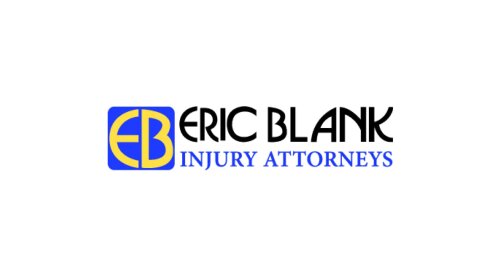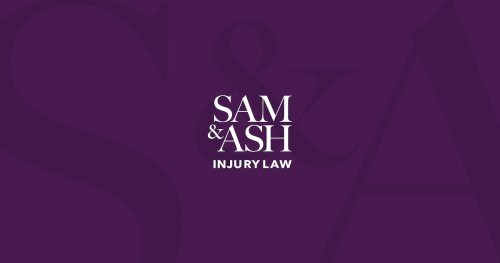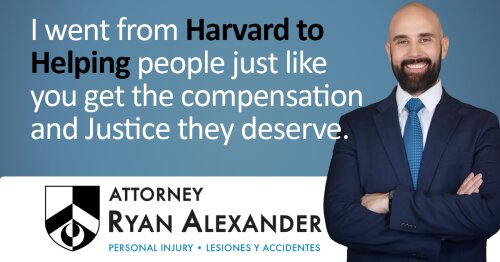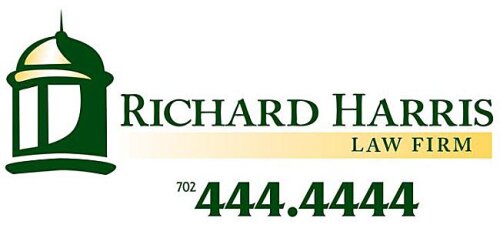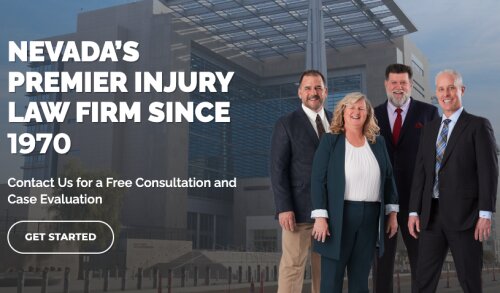Best Insurance Lawyers in Las Vegas
Share your needs with us, get contacted by law firms.
Free. Takes 2 min.
List of the best lawyers in Las Vegas, United States
About Insurance Law in Las Vegas, United States
Insurance law governs the relationship between insured parties, insurance companies, and insurance agents. In Las Vegas, insurance matters are shaped by federal law, Nevada state law, and local court procedures. Common types of insurance issues include automobile coverage, homeowners and renters insurance, commercial policies, health and life insurance, workers compensation, and specialty coverages such as flood or earthquake endorsements.
Practically speaking, insurance law addresses policy interpretation, claim handling procedures, insurer duties, contract disputes, regulatory compliance, and remedies when an insurer wrongfully denies or underpays a claim. Las Vegas residents often face insurance issues after auto collisions, property damage from storms or fire, disputes over business interruption coverage, and litigation arising from alleged bad-faith conduct by insurers.
Why You May Need a Lawyer
Insurance disputes sometimes resolve quickly, but many situations benefit from legal help. You may need a lawyer if:
- Your claim was denied or only partially paid and the insurer will not provide a satisfactory explanation.
- You suspect insurance bad-faith - for example, unexplained delays, refusal to investigate, misrepresentation of policy terms, or improper pressure to settle for less than covered value.
- Your insurer disputes coverage based on ambiguous policy language, exclusions, or alleged misstatements on an application.
- You suffered a large loss - such as major property damage, a significant auto injury, or substantial business interruption - where valuation, causation, or scope of coverages is contested.
- You are facing a coverage lawsuit from a third party or you need subrogation assistance after paying a claim.
- There are complex or technical issues - for example, disputes over commercial general liability, professional liability, construction defect coverages, or insurance tied to regulatory compliance.
- You need advice on arbitration clauses, mediation, or whether to file a lawsuit in court.
Local Laws Overview
Nevada law and state regulators play a central role in insurance matters affecting Las Vegas residents. Key local-law considerations include:
- State regulation and consumer protections - Insurance companies doing business in Nevada are regulated by the Nevada Division of Insurance. The division sets licensing rules, examines insurer practices, and maintains consumer complaint procedures.
- Policy interpretation - Insurance policies are contracts governed by Nevada contract law. Courts interpret ambiguous policy language in light of the plain meaning rule and often construe ambiguities in favor of the insured.
- Bad-faith and remedies - Nevada recognizes legal remedies when an insurer wrongfully denies or handles a claim in bad faith. Remedies can include contract damages and, in some circumstances, additional tort damages. Case law and agency guidance shape what conduct constitutes bad faith.
- Auto insurance requirements - Nevada requires drivers to maintain financial responsibility and minimum liability coverage levels. Proof of insurance and limits affect how claims and settlements proceed after accidents.
- Workers compensation and employer obligations - Nevada has a statutory workers compensation system that governs employee injury claims and employer reporting obligations. Disputes over claims, coverage, and settlement of workers compensation matters have distinct administrative procedures.
- Litigation venue - In Clark County, which includes Las Vegas, insurance litigation commonly proceeds in district court when parties file suit. Some disputes may be subject to arbitration if the policy contains an arbitration clause.
- Administrative remedies and complaints - Before or alongside litigation, insureds can file complaints with the Nevada Division of Insurance. The division can investigate and mediate consumer complaints but does not provide private legal representation.
Frequently Asked Questions
What should I do first after an accident or property damage?
Prioritize safety and immediate needs. For auto accidents, get medical attention and report the accident to law enforcement if required. For property damage, take steps to prevent further loss when safe to do so, such as boarding up windows or making temporary repairs. Document the scene with photos and videos, gather witness names, and notify your insurer as soon as possible. Preserve receipts and records of expenses related to the loss.
How long do I have to file an insurance lawsuit in Nevada?
Time limits vary by claim type and the legal theory involved. Statutes of limitations and contractual deadlines can apply to breach-of-contract and tort claims. Because deadlines can be strict and vary by situation, contact an attorney promptly to determine applicable timelines and to avoid losing the right to sue.
What is insurance bad faith, and how do I know if it applies?
Bad faith generally refers to unfair or unreasonable conduct by an insurer in handling a claim. Examples may include unreasonable delays, denying a claim without investigation, misrepresenting policy terms, or refusing to pay a valid claim. Whether behavior rises to bad faith depends on the facts and applicable law. An attorney can evaluate the insurer conduct and advise on remedies.
Can I sue my insurer for refusing to pay my claim?
Yes, you can often file a lawsuit for breach of the insurance contract when an insurer wrongfully refuses to pay. In some cases, an insured may also pursue tort remedies such as bad-faith claims. Before suing, review your policy terms, any pre-suit notice requirements, and consider whether dispute resolution clauses require arbitration.
Do I have to accept the insurer's settlement offer?
No. You are not required to accept a settlement offer unless it fairly reflects the value of your claim and you are comfortable with the terms. Before accepting, consider whether the offer covers all damages, future expenses, and losses. If unsure, consult a lawyer who can evaluate the offer and negotiate on your behalf.
Will my insurance rates go up if I file a claim?
Filing a claim can affect premiums, depending on the nature of the claim, your insurer’s underwriting policies, and your claims history. Some claims, such as at-fault auto accidents, are more likely to lead to higher premiums. Discuss concerns with your agent and consider legal options if you believe the claim denial or handling was improper.
What documents should I gather before meeting an insurance lawyer?
Collect your policy documents, declaration pages, all correspondence with the insurer, claim numbers, photos and videos of the loss, repair estimates, medical records and bills if injuries occurred, police reports, witness statements, and any denials or explanations of benefits. Organized documentation helps a lawyer assess your claim more efficiently.
Can I file a complaint with a government agency?
Yes. The Nevada Division of Insurance accepts consumer complaints and can investigate insurer practices or assist with problems such as claim handling or licensing issues. Filing a complaint does not replace private legal action, but the division may mediate or take regulatory steps if it finds violations.
What is uninsured or underinsured motorist coverage and do I need it?
Uninsured motorist and underinsured motorist coverage help protect you when the at-fault driver lacks sufficient insurance to cover your damages. These coverages can be important in areas where uninsured drivers are common. Whether you "need" it depends on your risk tolerance, assets, and state law. An advisor can help you evaluate appropriate coverage levels.
How do I find a qualified insurance lawyer in Las Vegas?
Look for attorneys who focus on insurance litigation or insurance coverage disputes and who have experience in Nevada courts. Ask about years of experience, track record with similar claims, fee arrangements, and whether they offer a free initial consultation. Check disciplinary records through the State Bar of Nevada and seek referrals from trusted sources.
Additional Resources
Nevada Division of Insurance - the state regulator that handles licensing, consumer complaints, and policy oversight.
State Bar of Nevada - provides attorney referral services and resources to verify lawyer credentials and disciplinary history.
Clark County District Court - where many civil insurance cases in Las Vegas are filed and adjudicated.
Nevada Legal Services and local legal aid clinics - offer assistance for qualifying low-income residents and can help with consumer and insurance matters.
Local law libraries and self-help centers - provide legal forms and research materials for those preparing claims or learning more about procedures.
Next Steps
1. Preserve evidence - Photograph damage, keep receipts, and save all communications with your insurer.
2. File timely notices - Report the claim to your insurer per policy requirements and follow any administrative steps required by law or your policy.
3. Document everything - Keep a claim file with dates, names of adjusters and representatives, and summaries of phone calls or meetings.
4. Consider informal resolution - Ask for a detailed explanation for denials or low offers, request a re-evaluation, and use the insurer appeal or internal-review process.
5. File a complaint with the Nevada Division of Insurance if you believe the insurer violated consumer protections.
6. Consult a qualified insurance attorney - Especially for large losses, suspected bad faith, or complex coverage disputes. Prepare your documentation and ask about fee structures, experience, and likely timelines.
7. Evaluate dispute resolution options - Discuss whether mediation, arbitration, or litigation is appropriate given the facts and your policy terms.
If you need legal help, act promptly. Insurance disputes can involve strict deadlines and procedural requirements. A local attorney experienced in Nevada insurance law can review your policy, advise on options, and help protect your rights.
Lawzana helps you find the best lawyers and law firms in Las Vegas through a curated and pre-screened list of qualified legal professionals. Our platform offers rankings and detailed profiles of attorneys and law firms, allowing you to compare based on practice areas, including Insurance, experience, and client feedback.
Each profile includes a description of the firm's areas of practice, client reviews, team members and partners, year of establishment, spoken languages, office locations, contact information, social media presence, and any published articles or resources. Most firms on our platform speak English and are experienced in both local and international legal matters.
Get a quote from top-rated law firms in Las Vegas, United States — quickly, securely, and without unnecessary hassle.
Disclaimer:
The information provided on this page is for general informational purposes only and does not constitute legal advice. While we strive to ensure the accuracy and relevance of the content, legal information may change over time, and interpretations of the law can vary. You should always consult with a qualified legal professional for advice specific to your situation.
We disclaim all liability for actions taken or not taken based on the content of this page. If you believe any information is incorrect or outdated, please contact us, and we will review and update it where appropriate.
Browse insurance law firms by service in Las Vegas, United States
Las Vegas, United States Attorneys in related practice areas.



